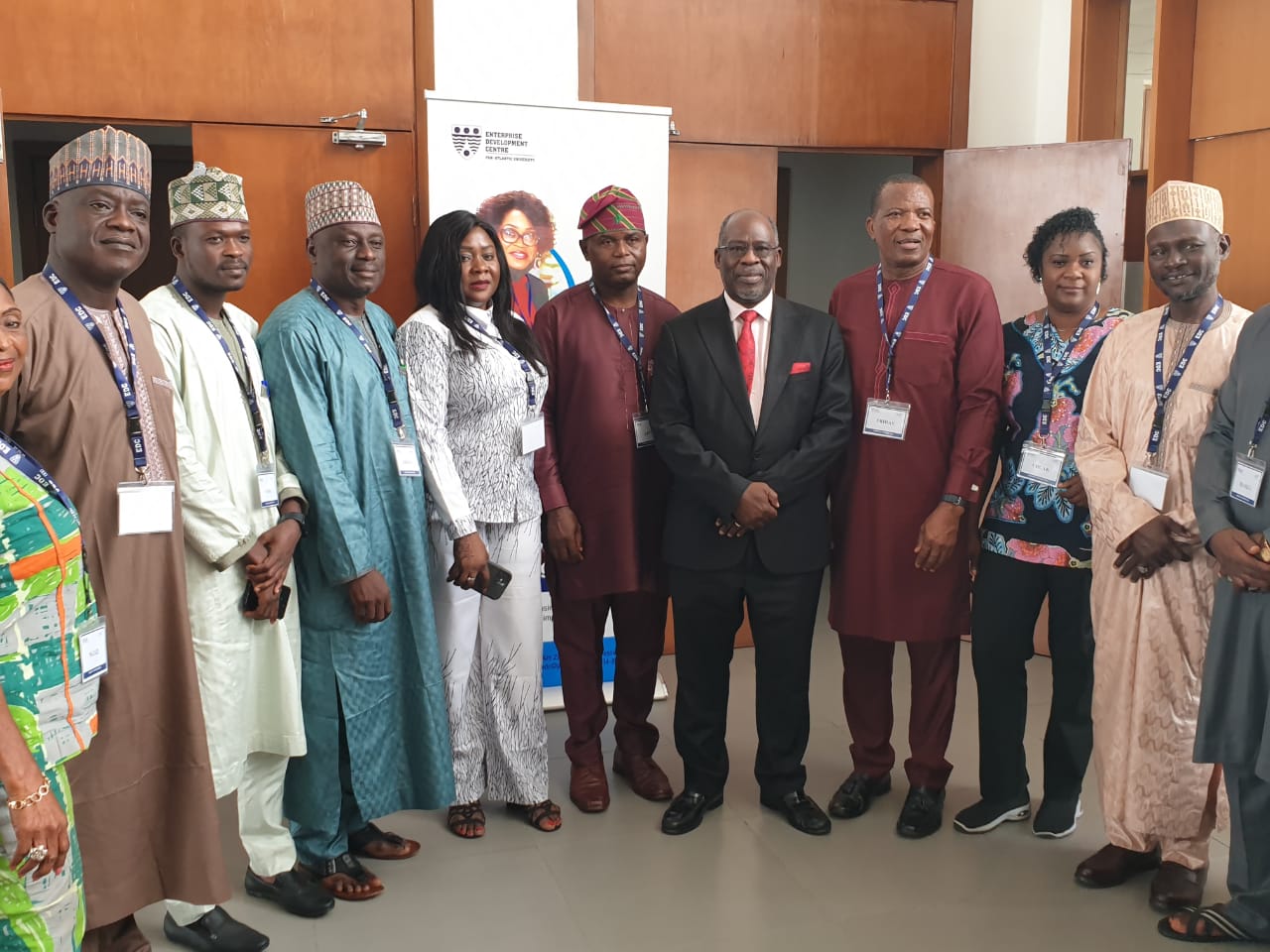Organised Private Sector Frowns, says N70, 000 Minimum Wage Unsustainable

From six left, the Director General, Small and Medium Enterprises Development Agency of Nigeria (SMEDAN), Mr Olawale Fasanya, The Director, Enterprise Development Centre, Pan-Atlantic University, Lagos, Dr Peter Bamkole, Dr Mrs Uduak Mbong, HOD, Business Admin Arthur Jarvis university Cross River, commended SMEDAN andDirector, Entrepreneurship Development Center, Fedetal University Brinin Kebbi, Prof. Isa Garba, during the opening ceremony of the of SMEDAN Tertiary Institutions Entrepreneurship Programme (TINEDEP) at PAN Africa University-Entreprise Development Centre (EDC) held in Lagos on Monday.
Samuel Mobolaji
Members of Organised Private Sector (OPS) and Small and Medium Enterprises (SMEs) are grumbling at the New National Minimum Wage N70, 000 monthly, which most of them said, is unsustainable for the private sector.
The increase, which they said is 133 per cent over the last minimum wage of N30, 000, is seen as an additional burden on the shoulders of employers in the private sector.
Although OPS members are reluctantly trying to adopt it on condition that
Federal government plays its role in fulfilment of its promise, SMEs owners, mostly under the Federation Informal Workers of Nigeria (FIWON) have made known that they will not be able to pay the N70, 000, based on nature of the employers under them.
Earlier, the director general, Manufacturers Association of Nigeria (MAN), Segun Ajayi-Kadir, reiterated the call of OPS, saying, “on the side of the private sector, we should hold on to the promise of Mr. President that the federal government will find a way to assist us to pay the minimum wage. We maintained that those binding constraints may constitute impediments to the full compliance of our member when the minimum wage is signed into law.”
To this end, MAN brought out eight demands, saying: SMEs and MSMEs should be exempted from compliance in view of their incapacity and prevailing operational challenges, even as it called for CBN redemptions of all validly transacted outstanding forex forwards for companies in the productive sector, while it moved for reversal of increase in electricity tariffs OR only 100 per cent increase in electricity tariff for minimum of 20 hours of supply.
Duty exemption on imported conversion kits and government subsidy on procurement of same. While calling for a freeze on introduction of new taxes on businesses for the next five years, he advocated fixed rate of N800 for the assessment of import duty on all production inputs, revisiting of the recent Financial Reporting Council regulation to curtail its application to private businesses, discontinuation of the Price Verification Portal as it is inimical to the smooth operation of businesses and the basis for setting it up no longer exist, among others.
General Secretary, FIWON, Comrade Gbenga Komolafe stated that, since his members are mostly involved in micro and small businesses, they are reeling under the excruciating weight of high energy costs, high input costs, and ever fluctuating costs of stock and raw materials whereby they are family set-up made of parents with their children of housemaid,, as there would be no way they can take part in payment of N70, 000.
Another OPS Member, Mr Kayode Ejigbode pointed out that, the fight by organised labour for the new minimum wage followed due process based on the inflation that is making nonsense of monthly salary of most workers.
According to Ejigbode, “raising the bar is not an issue. The problem is ability to sustain the payment in the next three years until upward review of another salary.
“If President Bola Ahmed Tinubu has to run to lawmakers with request for N6.2 trillion supplementary budget, which N3trillion is meant to cover recurrent and N3.2 trillion for capital expenditure, and this taking the 2024 budget to N34.9 trillion from N28.7 trillion, all in bid to pay the new Wage, I wonder who will OPS and SMEs people run to for assistance to pay such in the next three years.”









